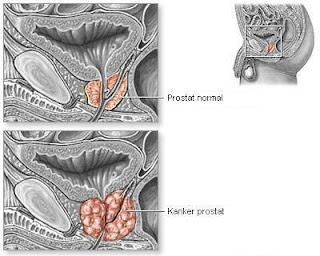Nursing Care Plan for Prostate Cancer - 3 Diagnosis and Interventions
The prostate is an exocrine gland of the male reproductive system, and exists directly under the bladder, in front of the rectum.
Prostate cancer generally affects men over 50 and is rare in younger men. It’s the most common type of cancer in men. Around 37,000 men in the UK are diagnosed with prostate cancer each year.
Prostate cancer is a disease which only affects men. Cancer begins to grow in the prostate - a gland in the male reproductive system. In the vast majority of cases, the prostate cancer starts in the gland cells - this is called adenocarcinoma. In this article, prostate cancer refers just to adenocarcinoma. Prostate cancer is mostly a very slow progressing disease. In fact, many men die of old age, without ever knowing they had prostate cancer - it is only when an autopsy is done that doctors know it was there.
The symptoms of both benign enlargement of the prostate gland and malignant tumours (cancer) are similar and can include any of the following:
- difficulty passing urine
- passing urine more frequently than usual, especially at night
- pain when passing urine
- blood in the urine (this is not common).
- Age
- Genetics
- Diet
- Medication
- Obesity
- Sexually transmitted diseases (STDs)
- Agent Orange
3 Nursing Diagnosis and Nursing Interventions for Prostate Cancer
1. Impaired Urinary Elimination related to an enlarged prostate, and bladder distension.
Intervention:
- Encourage the patient to urinate every 2-4 hours and when it suddenly felt.
- Observation of the flow of urine, note the size and strength.
- Percussion / palpation of the suprapubic area.
- Encourage fluid intake to 3000 ml per day.
- Monitor vital signs closely
- Collaboration in the provision of drugs.
2. Resti for Infection related to invasive procedures (tools during surgery)
Intervention:
- Maintain a sterile catheter system, provide catheter care and give regular antibiotic ointment around the catheter.
- Perform ambulation with dependent drainage bag.
- Observation of wound drainage around suprapubic catheter.
- Replace dressings with frequent (supra incision / retropubic and perineal), cleaning and drying of the skin over time.
- Collaboration in the provision of antibiotics.
3. Imbalanced Nutrition, Less Than Body Requirements related to the nausea and weight loss
Intervention:
- Assess the patient's nutritional status.
- Encourage the patient to eat small amounts frequently.
- Collaborate with a nutritionist.
- Collaborate with the physician in the delivery of antiemetic drugs.
ads

4 komentar:
this is good post.
and you can go here
http://bantalsilikon01.blogspot.com
http://kursusinternetmarketingmurah.blogspot.com
http://bumbupecelbali.blogspot.com
tanks very much.... :)
My uncle has been fighting cancer for the last month, and I didn't know that diet could have such a big effect. We've been keeping him on the same diet, he's always been on, but your post makes me feel like we should change that. Maybe, I'll be able to find a center where we could do, nutritional assessments on him. It sounds like getting his diet under control could be very helpful.
Sara Welsh
Thanks for sharing this wonderful and useful information, you have said the true facts that melted my heart. Your unique content may be helpful to many lives in getting the Old age homes in bangalore
It is great to hear people pursuing their dream and becoming successful.
Occupational Care